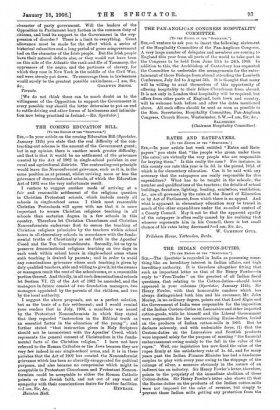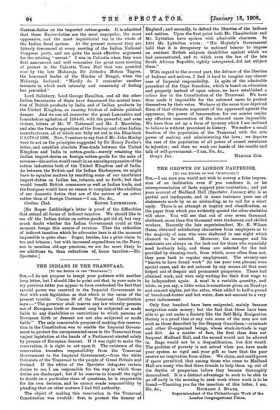THE INDIAN COTTON-DUTIES.
[To THE EDITOR OF THE "SPECTATOE.1
Sin,—The Spectator is regarded in India as possessing some- thing like an hereditary interest in Indian affairs, and high hereditary authority. It is therefore altogether fitting that such an important letter as that of Sir Henry Fowler—in .reply to "Free-Trader" on the greatest of all Indian fiscal questions, that relating to the Cotton-duties—should have appeared in your columns (Spectator, January 11th). Sir Henry Fowler, with that honourable candour which has always distinguished both him and his successor, Mr. John Morley, in no ordinary degree, points out that Lord Elgin and the Government of India were responsible for the imposition of the Indian Custom-duties on Lancashire and other imported . cotton-goods, while he himself and the Liberal Government were responsible for the countervailing Excise-duties, levied on the products of Indian cotton-mills in 1895. But he declares solemnly, and with undeniable force, (1) that the Custom-duties on the Lancashire and Scottish products were imposed solely for the purpose of meeting "the financial embarrassment owing mainly to the fall in the value of the rupee." Well, our legislation has now fixed the value of the rupee firmly at the satisfactory rate of is. 4d., and for many years past the Indian Finance Minister has had a handsome surplus to play with every year owing to the stoppage of the coinage of silver, a measure obviously in the nature of an indirect tax on industry. Sir Henry Fowler's letter, therefore, points to the propriety of the immediate abolition of these Cotton-duties. Sir Henry Fowler's letter also shows (2) that the Excise-duties on the products of the Indian cotton-mills were not imposed for the sake of revenue, but simply to prevent those Indian mills getting any protection from, the
Custom-duties on the imported cotton-goods. It is admitted that these Excise-duties are the most unpopular, the most oppressive, and the most inquisitorial tax in the whole of the Indian fiscal system. At the present moment they are bitterly denounced at every meeting of the Indian National Congress party, and are quite the most effective argument for the existing "unrest." I was in Calcutta when they were first announced, and well remember the great mass meeting of protest in the Calcutta Town Hall that was presided over by the late Maharaja Sir Jotindra Mohun Tagore, the honoured leader of the Hindus of Bengal, when the Maharaja declared : "Hardly do I remember another instance in which such intensity and unanimity of feeling has prevailed."
Lord Salisbury, Lord George Hamilton, and all the other Indian Secretaries of State have denounced the mutual taxa- tion of British products by India and of Indian products by the United Kingdom, as causing friction of infinite political danger. And we can all remember the great Lancashire and Lanarkshire agitation of 1894-95, with the powerful, and even violent, letters of Mr. W. Tattersall and Mr. J. Mawdsley, and also the frantic opposition of the Bombay and other Indian manufacturers, all of which are fully set out in the Blue-book C 8,078 of 1896. Now, I venture to say that if Mr. John Morley were to act on the principles suggested by Sir Henry Fowler's letter, and establish absolute Free-trade between the United Kingdom and India in cotton-goods—merely retaining the Indian import-duties on foreign cotton-goods for the sake of revenue—his action would result in an amazing expansion of the cotton industries both of the United Kingdom and of India. As between the British and the Indian Exchequers, we might have to equalise matters by remitting some of our exorbitant import-duties on Indian tea, tobacco, and so forth; but that would benefit British consumers as well as Indian trade, and the foreigner would have no reason to complain of the abolition of our domestic duties that are of the nature of an octroi rather than of foreign Customs.—I am, Sir, &c., [Sir Roper Lethbridge's letter is proof of the difficulties that attend all forms of indirect taxation. We should like to see all the Indian duties on cotton-goods got rid of, but very much doubt whether the Indian Government could at this moment forego this source of revenue. That the reduction of indirect taxation which he advocates here is at the moment impossible is quite clear. Sugar, besides, has a prior claim to tea and tobacco ; but with increased expenditure on the Navy, not to mention old-age pensions, we are far more likely to see additions to, than reductions of, home taxation.—ED. Spectator.]







































 Previous page
Previous page